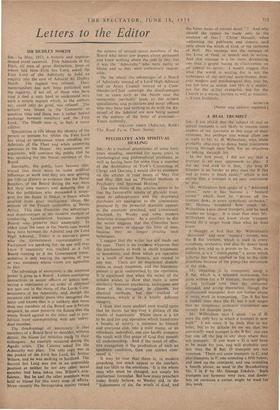Letters to the Editor
SIR DUDLEY NORTH
Slit,—In May, 1953, a historic and unprece- . dented event occurred. Five Admirals of the Fleet, all men of great distinction, three of whom had been First Sea Lord, asked the First Lord of the Admiralty to hold an enquiry into the case of Admiral Sir Dudley North. The request was refused. Their memorandum has now been published and the majority, if not all, of those who have read it find it very hard to understand why such a simple request which, as the authors say, could only do good, was refused. The subject was raised in the Commons at question time and there was a rather heated exchange between members and the First Lord. The North case is, in fact, a cause celebre.
Speculation is rife about the identity of the person or persons for whom the First Lord has acted as spokesman when rebuffing the Admirals of the Fleet and when answering questions in the House. No assurances, no arguments, will convince the public that he *vas speaking for the Naval members of the Board.
Inevitably, the public have become con- vinced that there must be some political Influences at work and they are now quoting inthe Official History as evidence that the Naval embers of the Board during the war were of their own masters and deducing that it was the politicians who demanded a scape- goat for the fiasco at Dakar, a fiasco which resulted from poor intelligence about the attitude of the French authorities in North Africa. This case illustrates the advantages and disadvantages of the modern method of conducting Government business through Boards who preserve their anonymity. In olden times the issue in the North case would have been between the Admiral and the Lord High Admiral. Today it is anyone's guess who the Government representatives in Parliament are speaking for; no one will ever know if unanimity was reached at a full Board meeting or if the Government repre- sentative is only voicing the opinion of one or two members whose views are agreeable to him.
The advantage of anonymity is the immense power it gives to a Board. Letters containing instructions to senior officers or letters con- veying a reprimand or an order of dismissal arc sent out in the name of the Lords Com- missioners of the Admiralty, and, though the recipient can usually guess who instigated the letter and knows that it is unlikely that more than two members of the Board saw Whefore despatch, he must preserve the fiction that the whole Board agreed to the letter and is pro- hibited from corresponding with any indivi- dual member. The 'disadvantage of anonymity is that members of a Board have to shoulder, without demur, the blame for mistakes mad,c by their colleagues. An example occurred during the Agadir crisis. The Cabinet asked for the Admiralty war plan. The only copy was in the pocket of the First Sea Lord, Sir Arthur Wilson, and he was stalking in Scotland. The Second Sea Lord was put in an impossible position as neither he nor any other naval Member had been taken into Wilson's con- fidence. But he and the other members were held to blame for this sorry state of affairs. More recently the Invergordon mutiny ruined the careers of several naval members of the Board who never saw papers about personnel and knew nothing about the cuts in pay, but it was the ' Admiralty' who were partly to blame and so they were collectively respon- sible.
On the whole the advantages of a Board of Admiralty instead of a Lord High Admiral and an Army Council instead of a Com- mander-in-Chief outweigh the disadvantages but in cases such as the North case the anonymity inevitably leads to the wildest speculations, and politicians and naval officers who may have had nothing to do with the dis- missal of the Admiral are now being named as the authors of the letter of dismissal.— Yours faithfully,


















































 Previous page
Previous page